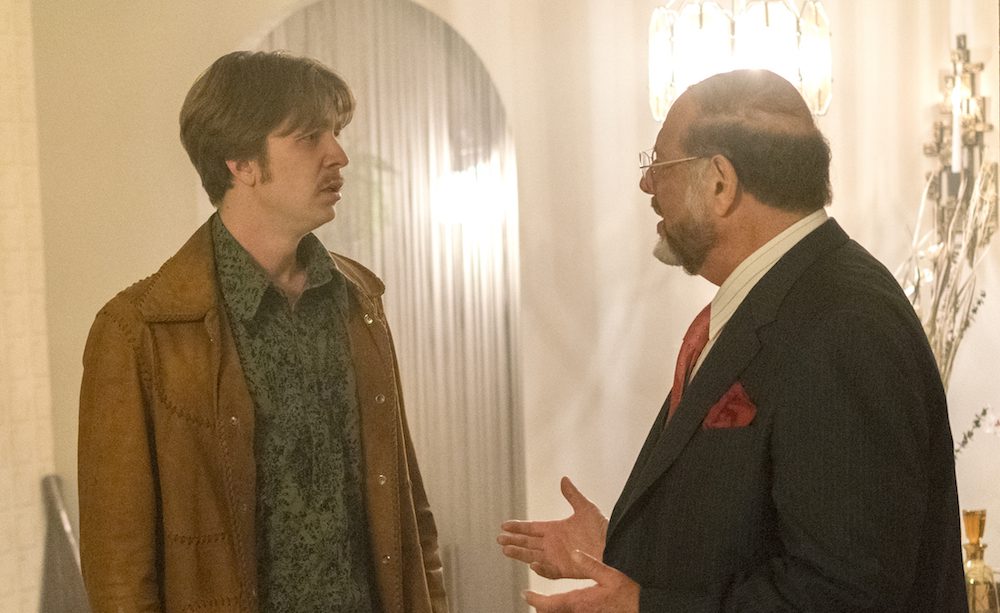Is there any working television actress who can carry an episode the way Carrie Coon can? There’s an outstanding first-season episode of The Leftovers called “Guest,” which flirts with the same themes of erasure that dominate “The Law of Non-Contradiction.” Coon ably carries both episodes, and continues to cement her status as one of the most watchable actors working in any medium. This might sound like I’m flirting with hyperbole, but I want to make it perfectly clear: Carrie Coon is terrific on Fargo, and this episode, the season’s best, does great work in showing her necessitude as a character.
One of the things that’s so wonderfully singular about Fargo is not only its ability but its willingness to shed its skin, however briefly, and functionally become a different show. “Non-Contradiction” achieves this by having Gloria travel to Los Angeles to try to put together the piece of the life of Ennis Stussy, also known as Thaddeus Mobley. One of the episode’s gimmicks – and even though there are several, “Non-Contradiction” never feels like a gimmicky episode – is its flashback structure, where we see a young Thaddeus (played by Thomas Randall Man) become seduced by Hollywood as Gloria retraces his steps in the present.
This episode is quite frankly a marvel of direction, which is astonishing because the director, John Cameron, hasn’t directed an episode of TV since one installment of Hercules: The Legendary Journeys in 1998 (but he is a longtime producer of Coen brothers movies like The Big Lebowski, so he knows what makes them tick). In just a few minutes – Fargo remains the undisputed king of montage and rapid exposition – Cameron gets you invested in Tad’s story, as he falls in with a sleazy producer, Howard Zimmerman (Fred Melamed), and a sinister starlet, Vivian Lord (Francesca Eastwood). It’s almost a shock to cut back to Gloria on the plane.
Perhaps Cameron’s greatest directorial coup is the episode’s animated sequences. Gloria reads her late stepfather’s book, The Planet Wyh, and visualizes the events of the story in animation provided by Floyd County, who animates Archer, which at times is the most visually arresting animated show on TV. The dramatization of the travails of the android MNSKY are at times gorgeous, at times adorable, and always memorable. “Non-Contradiction” is a terrific episode, but even if it were only remembered as the time Fargo became a cartoon, it would still be a classic.
Gloria’s journey through Los Angeles is dark, funny, and surreal, even if it is mostly plotless. Gloria learns more about Ennis Stussy, but she doesn’t crack the case, which is okay because it’s keeping with classic plotless Coen movies like Barton Fink or Inside Llewyn Davis (there’s even a bell that won’t stop echoing, just like in Fink‘s Hotel Earle). After getting her suitcase stolen by Santa (it makes sense in context), Gloria has a meet-douchebag with Officer Oscar Hunt, played to obliviously sleazy perfection by It’s Always Sunny in Philadelphia‘s Rob McElhenney. In a very funny episode’s funniest moment, Hunt gets Gloria to meet him at a bar, orders two beers, then turns to her and asks, “Do you want two beers?”
Thaddeus Mobley has seemingly been forgotten by everyone who was important to him in the 1970s. Zimmerman doesn’t remember him at all, until he remembers Thaddeus’s failure; Vivian acts as though they never even met. It dovetails nicely with Gloria’s existential crisis, as her identity is slowly being ebbed away by the arrival of the new chief in Eden Valley; several times she introduces herself as chief, before correcting herself and saying ex-chief, then wondering if she was right the first time. That in turn is paralleled in the animated sequences, where MSNKY travels an ever-changing earth for millennia, chirping “I can help!” and searching for the meaning of its own life.
There’s a wonderful recurring visual motif in “The Law of Non-Contradiction,” which kind of works as an exemplar of the show as a whole. In her motel room, Gloria finds a box. On the box is a switch. She flicks it and the box opens. Out comes a hand, which flicks the switch again, closing the box. A box is something that can be opened and closed as necessary, but this one is only good for the latter. Like Fargo itself, the box has a mystery which doesn’t necessarily require an explanation. (Remember that season two of this show low-key became an alien show.) But nevertheless, Gloria takes the box to Minnesota, carrying her new secret alongside her. Who knows if we’ll ever see the inside of it? Who wants to? Sometimes mysteries not only can’t be solved but shouldn’t. We know as much about Gloria’s box as she does about her stepfather: only as much as we need to.
A Few Thoughts
- Solid No Country for Old Men reference: Zimmerman refers to Thaddeus as a “swinging dick”
- Very happy to see Ray Wise pop up as Paul Marrane. He didn’t get a lot to do, but Fargo isn’t a show that makes mistakes, so I think he’ll be popping up again
5/5



